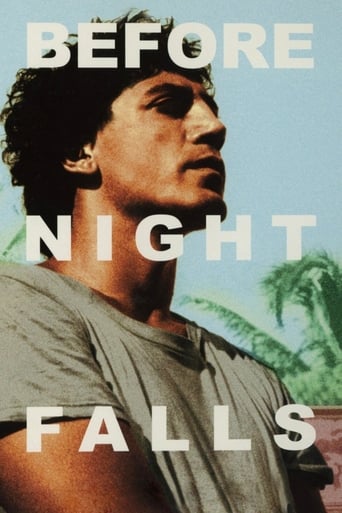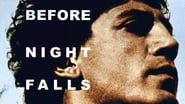filizeyuboglu-236-407113
2 months ago we were in Cuba.... I wanted to watch this film hoping to see some of the parts of the Cuba and remember my memories... But, I stop seeing the film at 48. minutes since I found the movie very anti-revolutionary :( Can one expect the opposite from a US film? Film just focused on gay issues and try to show the socialism bad! Can anybody tell that capitalism is very nice? Very good for all levels of people? or defense capitalism? Pls try to learn the system in Cuba. Still making films to show the socialism bad is funny and doesn't give to me good feelings about the director and the producers. As a second point, it's very disturbing -- in the film -- that Cuban in Cuba speak English!!! WHY??!?!? This frequently happens in many films which disturbs me too much and causes me to stop seeing the film. I'm not sure if the following is spoiler? I don't think so. I'm not against the gays of course, i know that they born that way, but we watched many films on gays.. I personally don't want to see them kissing and having sex. This is just the capitalism do; continuously making this kind of movies, etc..
Diego_rjc
This movie tells the story of Reinaldo Arenas, a homosexual Cuban writer and novelist that was chased during the communist period in Cuba. Only from this brief summary, you can see how powerful this life story is, and even though I haven't read the novel of the same name in which the movie is based on, it seems like the writers took full advantage of Reinaldo's story, going from his poor childhood in the Cuban countryside to his exile in the United States.The main role here goes to Spanish-born actor Javier Bardem. The only movie with him that I've watched is No Country for Old Men, and though he is outstanding in that picture, he does a much better job here. His acting is absolutely perfect. In every scene he is (almost the whole movie), he steals your attention. He is Reinaldo Arenas in this picture, no question about it. He deserved every award he got. And he does that with a supporting cast that has names like Sean Penn (in a very tiny appearance), Johnny Deep (playing two roles), Brazilian-born director Hector Babenco (also a small role), Diego Luna and other unknown actors.Julian Schnabel also does a very nice job directing. Even though a few of the shots reminded me a lot of Schnabel's latter The Diving Bell and the Butterfly, with very similar underwater sequences, shots of people in open cars, and open shots of the town and the woods, I appreciate his style. One shot in particular that is worth mentioning is the one in the beginning of the movie that comes out of the hole Reinaldo is playing and becomes an open shot of the small town. Beautiful work of directing. Another aspect that is worth mentioning is the photography. Both directors of photography do an excellent job, and the movie looks almost like a painting most of the time.From all this I have mentioned, this movie would get a 9 rating. But a few things bothered me. First, the movie is quite boring and slow most of the time, because of the lousy editing by Michael Berenbaum. You could easily cut off 20 minutes of the film. And also there are too many childhood memories throughout the movie completely unnecessary. But what bothered me the most is the language issue. This movie suffers from the same problem as Elia Kazan's Viva Zapata. Both of them have great acting and directing, and all the character's speak in English, but they should be talking Spanish! If this is Cuba, you expect a Spanish-talking picture, but instead you get a few random lines in the correct language. I know this is made to attract north-American audiences, but they should be faithful to the story. Thankfully, Julian Schnabel doesn't make the same mistake in The Diving Bell and the Butterfly. There, they speak French in France!Overral, this is a great film with outstanding acting and directing, but the language issue and the lousy editing keeps this movie alway from having a better rating. A must-see for Javier Bardem and Johnny Deep fans (the only time you can see him as a transsexual).7,5 out of 10, that in this case goes back to a 7.
moonspinner55
Javier Bardem gives one incredible performance in this wrenching auto-biography of Cuban poet and novelist Reinaldo Arenas who, in 1980, sought political asylum to the United States via his homosexuality after suffering for years under Castro's laws decrying political dissidents and sexual deviates. Born in the north Province of Oriente in Cuba in 1943, Arenas was raised mostly by his female relatives, his father having been banished from the family early on by his mother. Before he was a teenager, Arenas was already writing (carving words on tree trunks for the lack of paper); by the 1960s, he was in Havana studying at the university and winning awards and admirers. These early scenes work best for the film, as the narrative is lean and direct, and the lovely visual attributes (courtesy cinematographers Xavier Pérez Grobet and Guillermo Rosas) clearly delineate a particular (and turbulent) time and place with astonishing skill. The picture truly looks ravishing, and director Julian Schnabel relaxes the pace to help the viewer take it all in. Yet, after Arenas is arrested on fatuous molestation charges--and escapes from custody, and then gets caught and is put through hell--the film becomes more obscure, relishing in artistic flourishes but losing its immediacy. Arenas becomes the Patron Saint of Suffering. When Reinaldo finally gets to New York City, what should have been an exhilarating moment is squashed together with his sickness and death (10 years later!). It is to Bardem's credit as an actor that the final scenes work at all, because by this point we have lost touch with the inner-workings of the artist. Putting a writer's life on film has always been a difficult task for movie-makers (the process of creating isn't always a cinematic one), but Schnabel was doing so well in the first and second acts--allowing Reinaldo's talents to bloom--that it's doubly disappointing his final curtain should play as melodrama. **1/2 from ****
lastliberal
Reinaldo Arenas: Leonardo da Vinci was homosexual, so was Michelangelo, Socrates, Shakespeare, and almost every other figure that has formed what we have come to understand as beauty.It is fascinating that the socialist government in Cuba would take the same position as right-wing religious leaders in our country. I am sure that James Dobson, Pat Robertson, and others like them would not be happy to know that they are no different than Fidel Castro.This was the story of the poet Reinaldo Arenas, his mistreatment at the hands of the Cuban government, and his eventual escape to America in the Mariel boat lift; and Javier Bardem (Mar adentro, No Country for Old Men) was magnificent in the role that played almost like a documentary. The film was cinema-graphically brilliant, filmed near Cuba in the Yucatan. The soundtrack was equally impressive.Besides Bardem, it also featured Johnny Depp (Sweeney Todd: The Demon Barber of Fleet Street, Pirates of the Caribbean trilogy). Depp played a dual role as Bon Bon, a transvestite and was also Lt. Victor, the head of the prison in which Arenas was incarcerated. I am continually amazed at Depp's versatility.An outstanding Latino cast in a super film.




